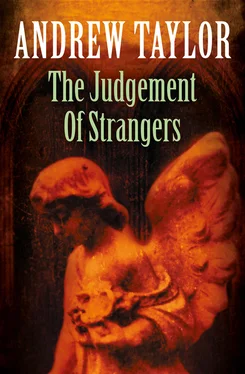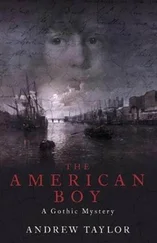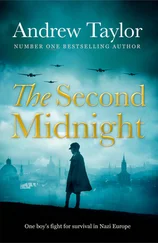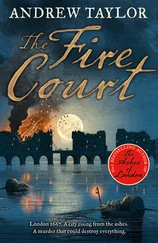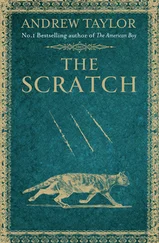The Vicarage was next to the churchyard, separated from it by a high wall of crumbling eighteenth-century brick. I walked through the little garden to our private gate, a relic of the old house, which gave access from the grounds of the Vicarage to the churchyard. As I opened the gate the church was suddenly revealed, framed in the archway.
Most of the exterior of the St Mary Magdalene was of brick, and in this light it looked particularly lovely: the older bricks of the sixteenth-century rebuilding had weathered to a mauve colour, while the eighteenth-century work was a contrasting russet; and together the colours made the church glow and gently vibrate against the blue of the sky. Housemartins darted round the tower.
I closed the gate behind me. Traffic rumbled a few yards to the left on the main road and there was a powerful smell of diesel fumes in the air. I caught sight of a shadow flickering through the grass near the gate to the road. I was just in time to see Audrey’s cat slipping behind a gravestone.
I walked slowly round the east end to the south door on the other side. On my way I passed the steps leading down to the Youlgreave vault beneath the chancel. The iron gate was rusting and the steps were cracked and overgrown with weeds. No one had been interred there for almost fifty years. The last Youlgreave to die, Sir George, had been killed in the Pacific in 1944, and his body had been buried at sea. I noticed there were grey feathers scattered on the bottom step, immediately in front of the iron gate, where no weeds grew. I wondered if Audrey’s cat was in the habit of dismembering his kills there.
I went into the porch. The door was unlocked – I left the church open during the day, though after two robberies I now locked it at night. Inside, the air smelled of polish, flowers and – very faintly – of incense, which I used two or three times a year. The church was small, almost cosy, with a two-bay nave and a low chancel. Above the chancel arch were the panel paintings, their colours murky; the pictures looked as if they were wreathed in smoke. I walked slowly to my stall in the choir. I sat down and began to say the Evening Office.
Usually the building itself had a calming effect on me, but not this evening. At times I found my mind drifting away from the words of the office and had to force myself to concentrate. Afterwards I simply sat there and stared at the memorial tablets on the wall opposite me. It was as though my will had abdicated.
Vanessa and Ronald, I thought over and over again. I wondered if I would be invited to the wedding and, if so, whether I should accept. By that time, perhaps it would no longer matter. I was aware, of course, that I was making too much of this. On the basis of two short meetings, I could hardly claim to have become deeply attached to Vanessa. The real problem was that, quite unintentionally, she had aroused my own long-suppressed needs. At the bottom of my unhappiness was a feeling of profound dissatisfaction with myself.
Time passed. Slowly the light slipped away from the interior of the church. It was by no means dark – merely less bright than it had been before. The memorial tablets were made of pale marble that gleamed among the shadows. Gradually there crept up on me the feeling that I was being watched.
I stared with increasing concentration at the tablet directly in front of me, which belonged to Francis Youlgreave, the poor, mad poet-priest. Everything led back to Vanessa. How odd that she should be interested in him. I remembered the lines that she had quoted to me at lunchtime. I could not recall the words exactly, something about darkness, I thought, and about whispers that defiled the judgement.
Defiled. It suddenly seemed to me that I was irredeemably defiled, not just by the events of the last few days, but by the active choice of someone or something outside me.
At that moment, I heard laughter.
It was a high, faint sound, like the rustle of paper or a whistle without a tune. I thought of wind among the leaves, of beating wings and long beaks, of geese I had seen as a boy flying high above Essex mudflats. Sadness swept over me. I fought it, but it turned to desolation and then to something darker.
‘No. Stop. Please stop.’
I was on my feet. The paralysis had dissolved. I stumbled down the church. The sound followed me. I put my hands over my ears but I could not block it out. The church was no longer a place of peace. I had turned it into a mockery of its former self. Defiled. I had defiled the church even as I had defiled myself.
I struggled with the latch of the south door. I was in such a state that it seemed to me that someone on the other side was holding it down. At last I wrenched it up and pulled at the door. I almost fell into the porch beyond.
Something moved on my right. Audrey’s cat, I thought for a split second, her wretched, bloody cat. Then I realized that I was wrong: that a person was sitting on the bench in the corner by the church notice board. I had a confused impression of pale clothing and a golden blur like a halo at the head. Then the figure stood up.
‘Hello, Father,’ said my daughter Rosemary. Her voice changed, filling with concern. ‘What’s wrong?’
At half past nine the following morning there was a ring on the doorbell. I was alone in the house. Rosemary had caught the bus to Staines to go shopping. I had managed to shave, but the only breakfast I had been able to face was a cigarette and a cup of coffee.
I found Audrey hovering on the doorstep, her body poised as if ready to dart into the hall at the slightest encouragement. I kept my hand on the door and tried to twist my mouth into a smile.
‘Sorry to disturb you, David. I just wondered what the verdict was.’
‘What verdict?’
‘You’re teasing me,’ she said in an arch voice. ‘The verdict on the book, of course.’
‘I’m so sorry.’ Indeed I was, though not for the reasons Audrey assumed. ‘I’ve not been able to talk to Mrs Forde about it yet.’
She stuck out her lower lip, which was already pinched and protuberant, and increased her resemblance to a disappointed child. ‘I thought you were going to phone her yesterday evening.’
‘Yes, I’d hoped to, but – but there was a difficulty.’
‘Oh. I see.’
‘I’ll try to talk to her today.’ I smiled, trying to soften the effect of my words. ‘I’ll phone you as soon as I hear something, shall I?’
‘Yes, please.’ She turned to go. She had taken only a couple of steps towards the road when she stopped and turned back to me. ‘David?’
‘Yes?’
‘Thank you for all you’re doing.’
My conscience twisted uncomfortably. Audrey smiled and walked away. I went back to my study and stared at the papers on my desk. Concentration demanded too much effort. I had slept badly, with dreams that hovered near the frontier of nightmare but did not actually cross it. One of them had been set in a version of Rosington, where Rosemary and I had lived before we came to Roth – when my wife Janet was still alive. I had not dreamed of Rosington for years. Vanessa had unsettled me, breached the defences I had built up so laboriously. (And I had been all too willing to have them breached.)
Audrey’s visit reminded me that I still had the problem of contacting Vanessa. I should have phoned her, as arranged, the previous evening, but I had spent much longer in the church than I had intended. By the time I had returned to the Vicarage the last thing I had wanted to do was talk to anyone, let alone Vanessa. I had persuaded myself without much trouble that it was too late to phone.
On the other hand, I could not run away from Vanessa for ever, or at least not until I had sorted out the business of Audrey’s wretched book. I did not want to phone her at the office, however, because that would mean having to run the gauntlet of Cynthia. I remembered that Cynthia worked only in the mornings. In that case, I thought, I would phone Vanessa this afternoon.
Читать дальше
